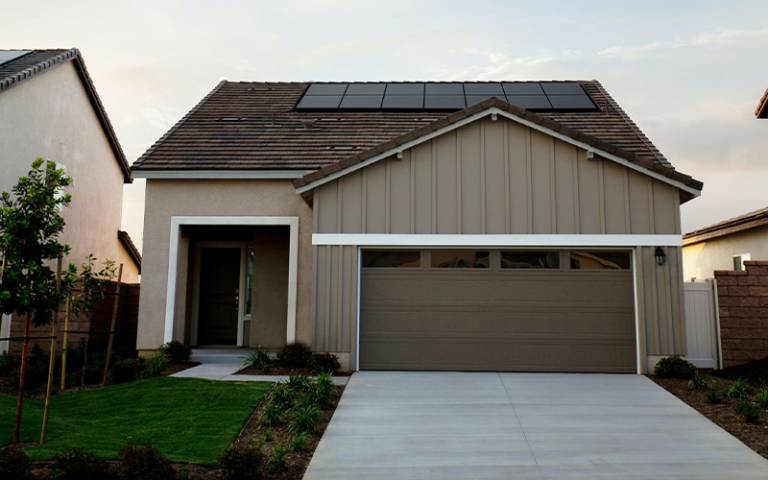New study investigates policies to encourage use of solar photovoltaics and battery storage in homes
21 April 2021
New paper from researchers at UCL, IIASA and Aalto University encourages residential electricity consumers to pair solar photovoltaics with battery energy storage.

In a new study, published in the journal Applied Energy, researchers from University College London (UK), IIASA (Austria), and Aalto University (Finland), proposed innovative policies to encourage residential electricity consumers to pair solar photovoltaics (PV) with battery energy storage. Installing solar panels to offset energy costs and reduce the environmental impact of their homes has been gaining popularity with homeowners in recent years, but there are still economic challenges that need to be overcome. The team investigated the barriers to the uptake of solar PV and proposed policies to increase deployment in the UK.
The study shows that without a battery, homeowners only use 30%–40% of the electricity from their solar PV panels, while the rest of the electricity is exported to the grid with very little to no benefit for the owner. With a home battery, the self-consumption of solar PV in the building almost doubles, allowing residents to reduce electricity imports from the grid by up to 84%, which can in turn help the owner to become less dependent on the grid and electricity prices.
It was concluded that while PV-batteries are presently not yet profitable for the average residential consumer, they can become so with the implementation of new policies and regulations. Various new energy storage polices have been proposed that offer a positive return on investment between 40% and 70% for residential PV-battery storage, depending on the policy. The study argues that national renewable energy policies should adopt more innovative incentives, to enhance the economic profitability of decentralized investments in a way that reflects their contribution to the electricity system.
The results indicate that this can be achieved, for example, by rewarding consumers for using their solar PV generation onsite, instead of encouraging them to export the excess solar energy they produce to the grid. This is done through an innovative ‘storage tariff’, which rewards residential battery owners for storing and discharging electricity whenever the system needs it. This way of operating a home battery could help reduce the pressure on the electricity grid at peak times, which could reduce prices for all consumers.
“New policies that reward storage for the benefits they provide will ultimately help the system become greener at lower cost”.
Says Dr Castagneto Gissey, who led the study adding that
The rapidly falling solar PV and battery storage costs will further aid the technologies to become fully profitable and reach their potential”.“
Lead author Behnam Zakeri, researcher with the IIASA Energy, Climate, and Environment Program concluded:
Traditional, central energy structures are transitioning to new systems based on decentralized, renewable energy solutions. This requires more flexible, modern, and effective policies that can guarantee the social and economic benefits of the energy transition. We hope our analysis contributes to a better understanding of the role of some energy policies that can promote decentralized energy solutions".“
Dr Giorgio Castagneto Gissey is the project lead, a former Senior Consultant and Principal Investigator for GB energy regulator Ofgem, and an Honorary Senior Research Fellow at the UCL Institute for Sustainable Resources, University College London.
Dr Behnam Zakeri is a Research Scholar at the International Institute for Applied Systems Analysis (IIASA). He also has academic affiliations with Aalborg University (Denmark) and Aalto University (Finland), as well as with University College London (UK).
Paul Dodds is Professor of Energy Systems in the UCL Energy Institute and the Institute for Sustainable Resources. He specialises in energy systems modelling and has particular interest in modelling hydrogen and bioenergy systems, and the importance of energy storage.
 Close
Close

